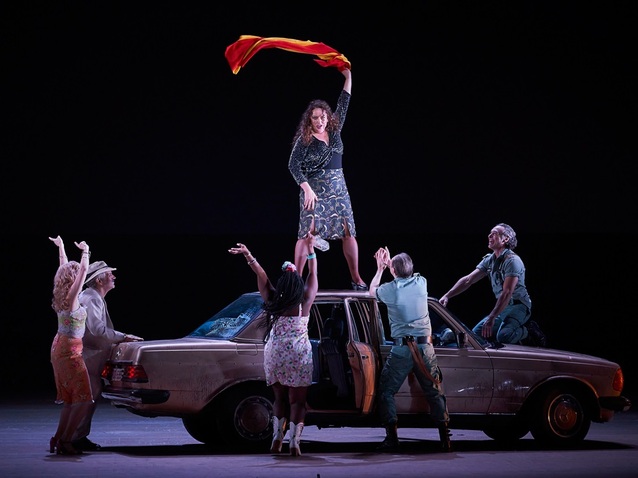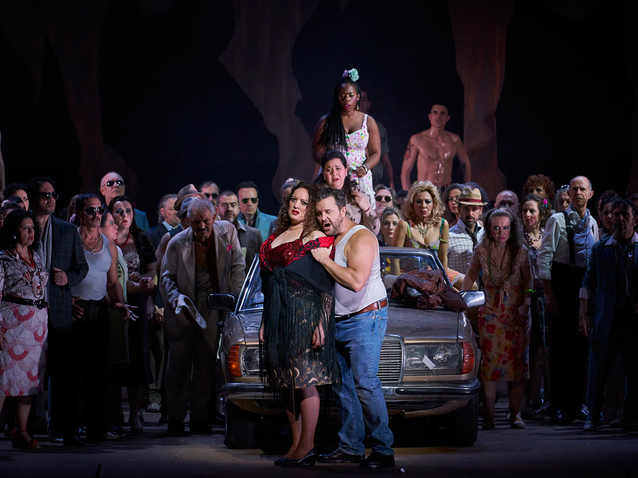 © Carmen, Gran Teatre del Liceu 2024
© Carmen, Gran Teatre del Liceu 2024
The Liceu has opened the year with a revival that is also a birthday party. In 1999, the Peralada Festival commissioned Calixto Bieito to stage direct a new production of Carmen. In 2010 and 2015 this Carmen, which has travelled to more than 70 theatres around the world, could be seen at Liceu. Now, on the 25th anniversary of the premiere, it has returned once again to the Barcelona stage.
Carmen was the title that placed Bieito's name in the international panorama of opera stage direction.
Carmen, especially in the first part, presents us with situations of intense eroticism, not a subtle and sophisticated eroticism, but direct, urgent, primitive. The traditional productions of the play suggested this eroticism and the audience, who usually knows how to read between the lines, was left to guess it as it unfolded. Bieito, who is not into subtleties or suggestions, places this eroticism in the foreground in a brutal, stark, exhibitionist way.
The context in which all this takes place is not that of a nineteenth-century postcard Spain but an uncertain, violent and border territory in late-Francoist Spain. A territory dominated by some brutalized military men who maintain among themselves and with the world a relationship based on abuse, violence, harassment and sexual obsession.
Bieito's explosive combination of feminine pheromones and testosterone overabundance makes sparks fly on stage. The Spanish stage director's reading is intense, on the edge, but, whilst not being the only possible one, it is pertinent and does not betray the spirit of the play.
In the second part and especially at the end, Carmen takes a very interesting turn that Bieito knows how to capture with success. The play is not so much about seduction and eroticism, but about the struggle for power within a couple. In this struggle, aware that it will cost her life, Carmen will always come out the winner. In the end a defeated, pathetic Don José will whimper on his knees before Carmen begging her not to force him to kill her.
All this powerful dramatic material is something which Bieito knows how to present very well on stage - he transcends the anecdote and focuses on the dramatic core of the play. The stage is progressively stripped of scenographic elements and in the last scene, with the stage completely empty, the confrontation of both characters reaches the grandeur of a Greek tragedy. With all its successes and excesses, Calixto Bieito's old Carmen is still full of strength.

Carmen - Gran Teatre del Liceu (2024)
Musically, the results achieved in the performance referenced here were good but not extraordinary.
Josep Pons, the chief conductor of the theatre’s orchestra said in the days before the premiere that the music of Carmen "is very refined and of an enormous delicacy while the characters act with knives". Pons left the knives for Bieito and devoted himself to obtain from the orchestra more delicacy, refinement and the varied timbre colour present in the score than dramatic intensity. The orchestra followed his intentions very well.
Clémentine Margaine is a very experienced Carmen who had already participated in this same production when it was presented years ago at La Bastille in Paris. Her voice is powerful, resounding and her knowledge of the style is profound. All of her Carmen is good and she endures perfectly and without faltering the vocal demands of her extensive role. Margaine's only problem is that she does not seem to feel sufficiently comfortable in the intense version of the character proposed by Bieito and does not give herself convincingly to this vision.
Michael Spyres who had to cancel his participation in the performance that took place two days earlier due to illness (he was replaced at the last minute by Freddie de Tommaso) sang very well, with exquisite musicality and knowledge of the character, but it seemed that he was trying not to risk himself vocally, and that he wanted to reserve strength to present himself with dignity in the dreaded final scene. He did well, he made it very well and accident-free to the end, but his performance overall was not memorable.
Micaëla, a rather flat character dramatically, is the counter-figure to Carmen, Micaëla is all sweetness. Guatemalan soprano Adriana González, who started out taking a lot of precautions, grew vocally as the work progressed and ended up giving her Micaëla a significant vocal presence.
Escamillo, a sort of Miles Gloriosus turned torero, has in his famous "couplets" one of the most brilliant moments of the work; it takes opulent, powerful singing and formidable vocal presence to do them justice, wich Simón Orfila has. He is an experienced Escamillo, his singing is good and the central area of the register is magnificent, but at the upper and lower ends the vocal rotundity diminishes.
Jasmine Habersham and Laura Vila were very good in Frasquita and Mercédès, Carlos Cosías in Remendado and very well the young baritone Jan Antem in Dancaïre. Felipe Bou as Zuniga was correct and Toni Marsol as Morales was absolutely immersed in his character. The extensive choral parts of Carmen received a globally good resolution, not exempt of some irregularities more in the male section than in the female one.
Xavier Pujol
Barcelona, January 10th, 2024
Carmen by Georges Bizet. Felipe Bou, bass. Toni Marsol, baritone. Michael Spyres, tenor. Simón Orfila, bass-baritone. Jan Antem, baritone. Carlos Cosías, tenor. Jasmine Habersham, soprano. Laura Vila, mezzosoprano. Clémentine Margaine, mezzosoprano. Adriana González, soprano. Orchestra of Gran Teatre del Liceu. Choir of Gran Teatre del Liceu. Children's Choir - VEUS Amics de la Unió de Granollers. Conductor, Josep Pons. Stage director, Calixto Bieito. Restaging, Lucía Astigarraga. Scenography, Alfons Flores. Costumes, Mercè Paloma. Lighting, Alberto Rodríguez Vega. Production by Gran Teatre del Liceu, Teatro La Fenice (Venice), Teatro Massimo (Palermo) and Teatro Regio (Torino). Gran Teatre del Liceu.
the 13 of January, 2024 | Print
Comments